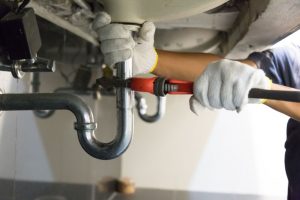
Plumber fixing white sink pipe with adjustable wrench.
Summer is just around the corner, and there are a number of summer-related issues that come along with it. This includes plumbing problems. You can have a much safer and happier summer if you know what might happen and what you can do to try to prevent them from occurring.
Common Plumbing Problems That Occur In The Summer
The following list is some of the most common plumbing problems that happen in the summer.
Shower Drain Clogs
Increased outdoor activity and the hot temperatures of summer usually means that we end up taking more showers during this time. That sometimes means we are showering of dirt and sand depending on what incredible outdoor activities we are enjoying on that specific day.
Of course, that means there is a higher chance that the shower drain will get clogged up.
The best way to prevent this from occurring is to rinse any sand or dirt off before you get into the shower. A hair catcher can also be used to help prevent large quantities of dirt and hair going down the shower drain to prevent clogs. Give Rochester Emergency Plumbing a call to discuss any advice they have on the regular maintenance methods you can use to help prevent your shower drain from becoming clogged.
Summer Rains Can Result In Flooding
Some houses that have basements might experience some flooding whenever heavy summer rains occur. Another problem that heavy rain might cause is to wreak havoc with the sewer lines. These two plumbing problems arise quite often during the summer.
Plumbing Problems That Occur During The Summer Months
To deal with basement floods, you should install a sump pump. If you haven’t done that already, we recommend that you purchase one, depending on the kind of property you have. If your house is located on a hill, and there is a very low chance that water will seep into the basement, then it might not be necessary to have a sump pump.
Otherwise, we recommend that you do have one. If you have questions about this, then, of course, please give us a call.
If you do own a sump pump, the following are 5 easy steps that we recommend you take to maintain it properly.
1. Check the plug – You should plug the sump pump into a ground fault circuit interrupter (GFCI) outlet. Sometimes the GFCI breaker might trip (especially when the area is damp). Therefore, check to make sure it’s still on or reset it if it isn’t.
2. Positioning – If your sump pump is a free-standing one (there are also in-ground models), then make sure it has not fallen over as a result of vibration either in the sump itself or in your house.
3. Test Out The Pump – Pour water inside of the pit. That should cause the unit to turn on automatically. If your pump does not start, you know that you need to have it serviced.
4. Cleaning – Take the submersible pump out of the pit. Then clean the grate out that is on the bottom part of the unit. Quite often debris and small stones can get caught in the grate which over time can damage the pump and block the flow of water.
5. Check for odors – If there is a nasty odor, then the water might not be flowing out of the trap and into the basin. To solve the problem, add 1 cup of bleach with a gallon of wae and pour this combination inside of the trap.
Smoothies and Garbage Disposals
During the summer, you may eat more vegetables and fruit – and that means salads and smoothies. This results in more peels and vegetable and fruit pieces being put down your garbage disposal.
Many people think they can put practically anything down their garbage disposal. However, that is not true.
The following are some summer foods you should avoid placing down your garbage disposal:
Watermelon rinds
Pineapple rinds
Celery
Lettuce
Cucumber peels
Corn husks
Carrots
The following are items that you should never put down garbage disposals:
Fibrous foods
Grains
Meats
Grease
Seeds and pits
Bones
Eggshells
Coffee grounds
Utensils
Summer Activities Means There Are More Clothes That Need To Be Washed
It is easy to end up overworking and overloading the washing machine. Also, during the summer, washing machines are used more often with all of the outdoor activities and hot temperatures.
Keep the loads small (don’t stuff your washing machine full). And check on it regularly to ensure it is not leaking. We recommend that you have a professional plumber check your washing machine, especially if you own an older model. That can help you prevent your laundry room from flooding.
If you have any plumbing problems or questions, please call us today.
